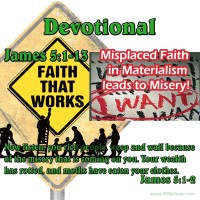

Read: James 5:1-3 |
Guy de Maupassant (1850-1893), considered the greatest French short story writer, rose from relative obscurity to fame and wealth within ten years of publishing his first works. He bought whatever came to mind, a yacht in the Mediterranean, a large house on the Norman coast, a luxurious apartment in Paris. The story is told that critics praised him, men admired him and women worshipped him. After all, he had all the trappings anyone would want. Yet at the height of his fame, he went insane, brought on by what those close to him called a “promiscuous lifestyle.”
On New Year’s Day in 1892, he tried to cut his own throat with a letter-opener, and lived out the last few weeks of his life in a private asylum on the French Riviera. He died at the age of forty-two, but before he went insane, he prophetically wrote what was to be his epitaph. Guy de Maupassant wrote, “I have coveted everything and taken pleasure in nothing.” Guy’s last days embody the very outcome James warns about in our text. Covetousness does not begat contentedness nor does it reflect Godliness.
James, “The Just”, was indignant and very forthright in declaring the folly of putting too much stock into what our money or possessions can do for us in this section. In the prior verses, he noted how silly it was to plan for tomorrow without God. He now follows up to note how silly it is to seek riches without a godly focus.
Misplaced love of money leads to sins
The love of money leads to greed and injustice and away from recognizing God as our Provider. In these verses, James warns us of four sins, which can result from greed and injustice. [Matthew Henry Commentary]
- Covetousness
- Oppression
- Sensuality
- Persecution
Covetousness is the result of hoarding our possessions and selfishly consuming everything (Ecclesiastes 5:10-20). We are to be a channel of blessings to others and not just a reservoir unto ourselves.
Oppression in this context is the result of the wealthy knowingly withholding payment from those who worked for them (Leviticus 19:13). We have to be careful in our day-to-day treatment of others that we do not take unfair advantage of a situation because we “know” we can get away with it.
Sensuality involves over-indulging our senses in pleasure and luxury. When we over emphasize our immediate happiness and satisfaction, we are no longer happy with a regular portion of a blessing and seek a larger blessing. Jesus taught that we should not store treasures on earth (Matthew 6:19-21).
Persecution occurs when we willfully wrong others. In this context, the wealthy were guilty of condemning and “murdering” the innocent by withholding full payment knowing they had no recourse. In our case, be an imitator of God and walk in love and consideration for all (Ephesians 5:1-13).
Repetitive unrepentant sins lead to miseries
James explains that the result of the sins of ignoring God as our Provider and looking only to ourselves are painful miseries. The miseries include:
- Despair of their wealth and possessions
- Guilt from the evidence against them
- Horrific pain from being devoured in the judgment upon them
When our trust and faith is not placed in God, then miseries arise from the very things in which we place our happiness (Luke 16:19-26).
James provides us with a clear warning and soothing encouragement. His warning is to beware of God’s judgment and flee any materialistic sin. His encouragement is to leave judgment to God while persevering in righteousness. Let us be careful not to fall for the folly of materialism in place of a relationship with the Master.
He who trusts in his riches will fall, But the righteous will flourish like the green leaf.
– Proverbs 11:28
Questions:
1.Discover –
A. Of the four sins noted Covetousness, Oppression, Sensuality and Persecution, do you struggle with any?
B. What can you do to break the cycle of these sins in your lives if present?
2.Develop –
A. How do you balance your wants versus your needs so that what you want does not pre-occupy and override your faith?
B. Give an example of a time when you were challenged by one of the four sins above. What was the situation? How did you overcome it? What happened?
3.Demonstrate –
A. What in your life demonstrates that you are not actively yielding to the sins noted above?
B. Paul notes in Philippians 4:11 how he had learned to be content in whatever circumstances he was in… Where are you on this journey to being content in whatever state you are in?

Wow…I started a bible study with a young couple from church and I was led to begin the study with the book of James… good teaching brother. I can borrow from your notes